Our Head of Business Operations, and increasingly regular blogger, Jon Keating has been taking the opportunity to follow up on a reflection he made at Elevate 2023 by visiting the NHS ConfedExpo in Manchester.
Here, he shares his thoughts and makes a rallying call for our industry to really prove itself in our ambition to be a trusted partner of the NHS.
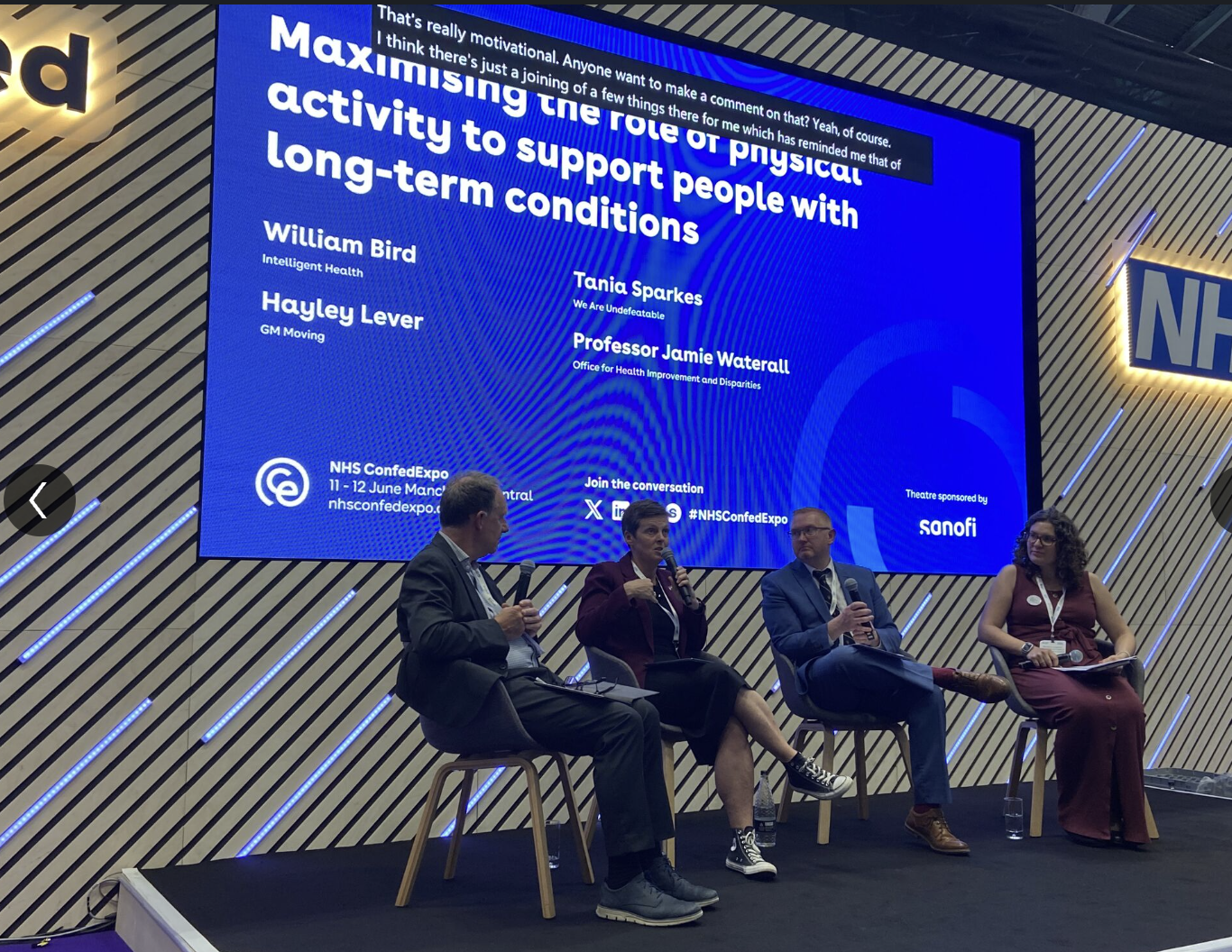
Two years ago, I wrote a blog reflecting on my visit to Elevate 2023, when I spoke of ‘the elephant in the room’ after one of my fellow panellists then left London to travel to a health conference in Manchester.
For those who don’t have a memory like an elephant, this is what I said: “And here’s the elephant in the room – quite literally. Yes, ‘leisure’ was there; but where was ‘health’?
“In fact, one of my panel members declared she was leaving London and heading straight back to Manchester to participate in another panel session at a health conference. I couldn’t help thinking why these events are not connected?”
The health conference in question was the NHS ConfedExpo, billed as the UK’s leading health and care conference, dedicated to driving innovation and improving care for patients and the public.
Up until this year, the NHS expo and Elevate had shared the same dates, often stated as one of the reasons for the disconnect, after all we can’t be in two places at once.
Given the unprecedented opportunity to attend both Elevate and the expo, I did – and discovered two elephants!
The one at Elevate still looms as large as it did two years ago, but now it has a cousin firmly ensconced in the NHS ConfedExpo arena!
To my knowledge, there were few (if any) allied health practitioners and physios etc at Elevate.
By the same token, there was only a handful of us from ‘leisure’ at the NHS expo (me, Michelle Childs, who leads our health steering group; Hayley Lever, of CEO of GM Moving, who was a panellist; Jack Murphy, P4C Programme Lead and Ben Ward from Innerva.)
So, while our industry celebrated at Elevate, it was by no means a huge leisure contingent at the expo.
Simultaneously, it would appear, the NHS doesn’t recognise enough the value our industry can provide it with, both in terms of a lack of physical presence at Elevate, but also in the little recognition given to physical activity at the expo.
At the risk of repeating myself from my elephant in the room blog, the pivot/transformation (whatever you want to call it) that we all cherish so much simply cannot happen without health and leisure operators sharing the same space.
The whole ecosystem around Greater Manchester has a decade or so to evolve, so if we are to make an impact and a difference, these connections need to be developed and amplified.
I originally added ‘at the earliest opportunity’ to that statement. Sadly, the opportunity has been lost to another two years of plentiful discussion that doesn’t always equate to a similar amount of action.
So, I have this message for my esteemed colleagues in ‘leisure’:
“Take time out of your inward-looking diaries for next year’s NHS ConfedExpo and create a leisure presence there that will help us to shift the dial and show the NHS that we really are capable of being its valued partner.”
In fact, at our most recent health steering group, we agreed that we should have a strategic presence and somehow lobby the expo organisers and influence the need for a physical activity and movement theatre.
This includes our Strategic Business Partners Innerva, Technogym and Active IQ, who all want to be part of this with us too.
Before I document what we can expect to gain by attending next year’s NHS Confed Expo, I’d like to share an insight into the future of the NHS courtesy of Rt Hon Wes Streeting, Secretary of State for Health and Social Care, who was a keynote speaker.
Here’s a precis of his core themes:
The government is reimagining the NHS – not as a ‘top-down’ reorganisation, but with a shift in mindset and delivery.
From ‘sickness to prevention’ is a major theme in the forthcoming 10-year plan for the NHS.
Investment and reform with include £10 billion to digitise the NHS, with a 50% increase in the tech budget.
Fewer targets, more freedom by reducing bureaucracy to empower local systems.
Patient-centred care – the ‘patient is king’, he said. Outcomes and experiences matter most.
Empowering Integrated Care Boards (ICBs) and communities with more strategic commissioning, local flexibility, and community focus.
Tackling health inequalities by addressing social determinants and injustice.
Leadership and accountability – clarity, consequences, and collaboration are key.
As you will discover as you continue to read through this blog, there is much for ‘leisure’ and ‘health’ to collaborate on…
What Michelle and I discovered at the expo was a landscape of aims and aspirations that share common goals with those of our own transformation to active wellbeing.
The event is huge, including about 180 different seminars – we managed to attend several of the most relevant.
The key themes coming out were systemic transformation, neighbourhood health and prevention, partnerships and ecosystem, workforce and operating model, and finance and value. Here’s each one in a little more detail.
Systemic transformation – delegates were told of three major shifts the NHS aspires to: quality and innovation, workforce transformation, and financial reform. As Mr Streeting explained, the move from treatment to prevention, via a reimagined NHS, will be patient-powered and community-driven. There is also emphasis on devolved systems, localism, and place-based partnerships.
Neighbourhood health and prevention – neighbourhood care is central to this with localised, community-informed, and prevention-focused services. ICBs will drive outcome-based commissioning while population health and community needs will guide service design.
Partnerships and ecosystem – the NHS should work as a partner, not a dominator, with other organisations and sectors, such as the third sector, councils, housing, etc, co-creating solutions with communities and empowering them to manage their own health. Technology will help to streamline services and reduce inefficiencies.
Workforce and operating model – radical workforce reform is expected to create a flexible, tech-enabled, and community-embedded way of working. Expect new operating models with less bureaucracy, more autonomy, and a focus on outcomes.
Finance and value – there is a shift to longer-term revenue budgets aimed at prevention allied to a focus on value for money, quality, and the removal working silos.
The opportunities for us to partner with the NHS are plain to see, those key themes mirroring many of our own.
What we have to offer is not as the panacea, however, it’s part of the holistic approach to prevention and management of long-term conditions. So, who’s up for the journey?
One of the seminars I attended (Leadership in action – from sickness to prevention) revealed that 20% of the population accounts for 70% of healthcare costs.
There were other eye-catching facts and figures among some of the other seminars:
On a more positive note, there is potential for £32 billions of inward investment, while the £7 billion ICB budget for Greater Manchester represents a major opportunity for innovation.
The key shifts said to be necessary for positive change included radical reform in primary care and commissioning, while the others very much aligned with our own thinking:
Whilst physical activity didn’t feature prominently, I attended a session called ‘Maximising the role of physical activity to tackle long-term health conditions’, which featured Hayley Lever, CEO of GM Moving.
It was here that the underactive 12 million adults and 2 million children fact came to light, and the discussion covered a perceived empathy gap between exercise professionals and patients, and a disconnect between evidence and practice – both in need of cultural and mindset shifts across the system.
Echoing sentiments heard at Elevate previously, shift the emphasis from physical activity to simply moving more as business-as-usual, it was said.
Recognise movement as a fundamental right in care and embed movement into holistic, person-centred care.
Yet again, this highlights a number of opportunities for GM Active, and other similar public sector health, fitness and wellness operators, by:
So, what does this all mean for public sector leisure and organisations like GM Active?
With many successful and sought-after physical activity referral programmes – not least Prehab4Cancer – already well established, attending the NHS ConfedExpo 2026 is a massive opportunity to amplify our stakeholder status with the NHS by illustrating what we are capable of:
I’m not saying we shouldn’t be at Elevate – I’m saying we should be at BOTH!
Our Active Academic Partnership (AAP) with Keele University is looking closely at engagement – firstly with communities to get more people active and secondly with partners in the healthcare sector to encourage closer ways of working.
Our Head of Business Operations, Jon Keating, has been speaking to Dr Kris Sorenson, a senior research fellow at Keele University, to explore more about our AAP and how it is shaping our Pivot to Active Wellbeing.
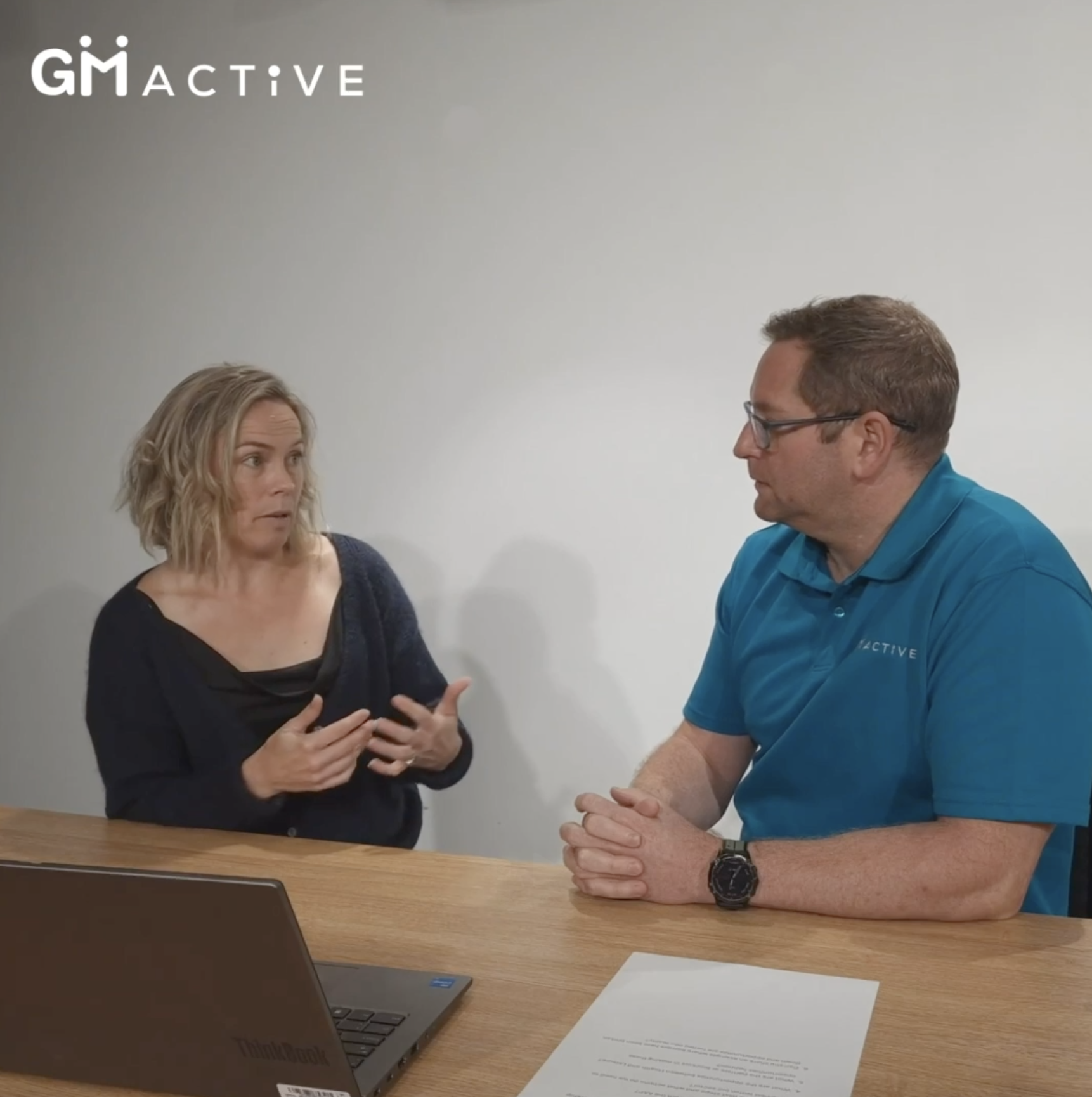
GM Active is a collective of 12 leisure and community organisations across Greater Manchester all sharing the same vision – to get more people physically active so they can live healthy, happy and longer lives. It is a not-for-profit community interest company (CIC), which manages the majority of publicly owned leisure and physical activity services on behalf of the 10 local authorities in Greater Manchester.
Patients engaging with Prehab4Cancer, the world-leading exercise, nutrition and wellbeing programme for cancer patients in Greater Manchester and parts of Cheshire, display increased aerobic capacity, better lower limb function and overall strength – all leading to improved quality of life.
The outcomes are shown in the latest annual report from Prehab4Cancer (P4C) and are being highlighted to mark World Cancer Day (February 4, 2025).
P4C is the first UK ICS-delivered prehabilitation and recovery programme for cancer patients, via a partnership between GM Active and GM Cancer Alliance. It facilitates engagement in exercise, nutrition, and wellbeing assessments and interventions before, during and after treatment. The programme is offered to patients with lung, colorectal (bowel) and oesophageal and gastric cancers, often referred to as upper GI cancers.

The latest outcomes show improvements in patients’ general health, physical activity levels and self-efficacy determined using the following benchmarks:
Here are the outcomes for each tumour group:

P4C programme leader, Jack Murphy, says: “We’ve had another positive year for referral numbers in to the service – two consecutive years of approximately 2,000 referrals, highlighting the success and reputation of Prehab4Cancer.
“There’s been an improvement in the uptake and engagement into the service too, with an average of 72% across all patient groups. The return to face-to-face delivery has been key to this and the percentage uptake is now similar to pre-Covid levels despite an increase in referrals.
“A cancer diagnosis can have a massive impact on a person and increasing physical activity levels during cancer treatment is often the last thing on a person’s mind.
“But with physical activity and our support, people can take a proactive role in their own care and have a positive impact on their health outcomes”
“As a result, they feel empowered to take back control of the diagnosis, whilst optimising their physical and mental condition, to better cope with the rigours of cancer-related treatment.”
The latest outcomes corroborate independent research used to secure recurrent funding for Greater Manchester P4C, which found that hospital patients were able to be discharged home sooner and enjoyed a better recovery.
Headline results for colorectal patients included:
The shorter hospital stays ‘released’ 550 ward beds days and 146 critical care bed days, resulting in increased capacity and patient flow.
Bed days ‘released’ from 1,000 colorectal prehab patients enables 179 additional patients to access timely surgery.
Bed days ‘released’ per prehab patient cover the costs involved in setting up and delivering P4C for a year.
P4C patients are encouraged to attend at least two sessions each week, ideally three, and are also urged to establish a walking routine and make use of a home exercise guide around their scheduled supervised sessions.
A typical standard timetable for a patient looks like this:
The P4C team receive some glowing testimonials from their patients, here’s a selection of some of the most recent.
RN from Trafford says:
“I am extremely grateful for having had the opportunity to take part in the Prehab for Cancer programme and indebted to those involved in its delivery for helping me to recover quickly from surgery and cope with the trials of undertaking chemotherapy treatment for cancer of the colon. I have really benefitted from the exercise programme and can see the results, as I have significantly improved my fitness and strength levels on all the measures over a four-month period. Anyone who is offered this programme and is trying to make a decision about whether to join it should not be put off.”
RA from Bury says:
“Having had investigative procedures soon after my 56th birthday, I was diagnosed with evidence of bowel cancer – small, and caught early, but still a shock. After surgery was agreed as the way forward, I was approached by GM Active and offered Prehab 4 Cancer. Gym induction by Karly was simple and well explained, setting realistic goals and a set of exercises aimed at stamina and strengthening core in preparation for surgery, including some work books and home exercise schemes. Pre-op assessment indicated improvements in walk-test and sit-to-stand which was nice. The team followed up soon after surgery to monitor my early recovery. Advice more recently has been on how to safely return to exercise and progress this on comfortably. Thank you to all those who helped me at GM Active. I don’t think you’ve created a gym-bunny but (you have) certainly opened my eyes to the benefits and how easy it was to get started and maintain a regular routine. I feel better now than I have for a long time.”
AF from Bolton says:
“When I was diagnosed with cancer of the oesophagus I was signed up to the cancer prehab team. I was totally against the idea. I did between 10,000 and 15,000 steps a day in my day to day life; I don’t need to go to the gym I thought. Regardless, I attended the physical assessment with my fitness and exercise specialist Karly, who managed to persuade me to attend the gym starting the following week. I attended against my better judgment and Karly constructed a programme for me to follow and encouraged me to attend again, which I did. I am still recovering and exceeding everyone’s expectations. I have been interviewed at the hospital asking me how I have recovered so quickly and what I did beforehand. My answer is this – fitness, faith and positivity all come from attending the gym and improving mind and body. I am now seven weeks post op and next week I will be back at the gym. Yes me!”
GM Active is a collective of 12 leisure and community organisations across Greater Manchester all sharing the same vision – to get more people physically active so they can live healthy, happy and longer lives. It is a not-for-profit community interest company (CIC), which manages the majority of publicly owned leisure and physical activity services on behalf of the 10 local authorities in Greater Manchester.
A significant increase in life satisfaction for people participating in GP exercise referrals has been emphasised in a survey we have commissioned across Greater Manchester.
It shows the mean scores for patients taking part were 1.9 points better than for those on a waiting list, using a scale of 1-10. By comparison, previous studies of changes in life satisfaction have found that moving from unemployment to finding work leads to an average 0.5 point increase.
The survey has been commissioned by GM Active, a collective of 12 leisure and community organisations representing all 10 local authorities in Greater Manchester, and conducted by State of Life, which works with its clients and economists on how to measure and report on the socio-economic value of physical activity. Using a tried a tested methodology recommended by the Treasury, State of Life has pioneered the creation of Wellby scores for people such as Sport England, parkrun, Youth Sport Trust and Ofcom.
The GM Active survey of more than 1,700 people either on a waiting list for a GP referral or taking part in a programme, also shows significantly improved scores for happiness, anxiety, loneliness and feeling worthwhile.
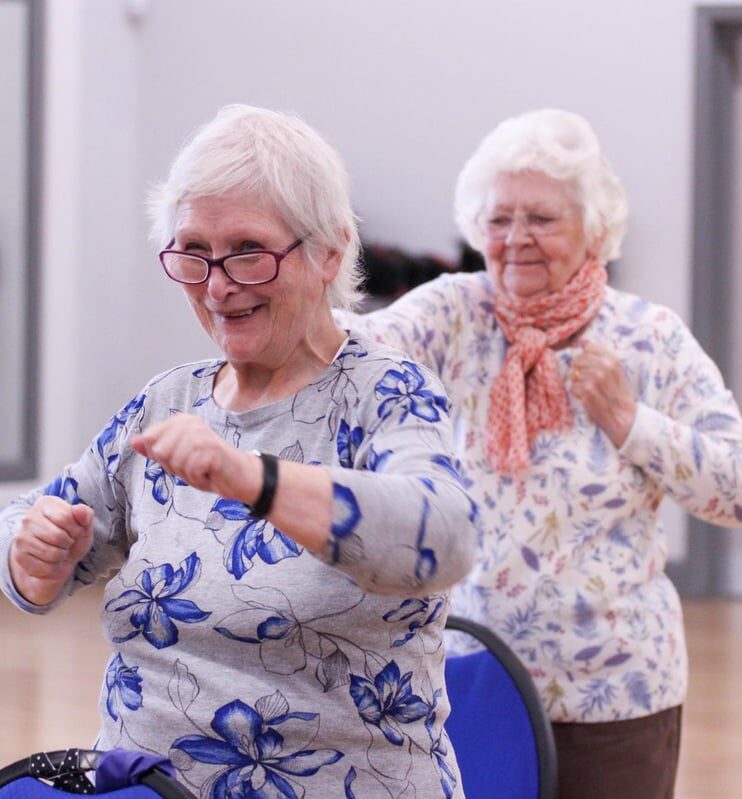
State of Life founder, Will Watt, says: “These results are what we call first findings and although there is similar work going on elsewhere, they’re significant because you’ve got a former health minister and Treasury secretary, Andy Burnham, as mayor, and integrated health authorities. This puts Greater Manchester ahead of the game in evidencing the worth of physical activity, and that could influence national guidance.
“What’s more, we’ve carried out what’s known as regression analysis. This means we’ve taken into account factors such as age, health, disability, socioeconomics, and employment status to give us more confidence that any positive difference we see in the scores is actually due to participation and not anything else.”
A repeat data collection is now underway until the end of January – described as creating ‘gold standard data’ – after which the findings will be broken down borough by borough and fed back to GM Active, whose strategy is focused on addressing physical inactivity and improving population health and wellbeing throughout Greater Manchester.
Andy King, GM Active Chair, says: “Will and his team at State of Life are doing a fabulous job, so a big thank you to them. The early results are really encouraging as they help demonstrate the positive impact the referral schemes are having on participants, and this helps us to evidence the impact they are having across Greater Manchester.
“This piece of work along with others such as UK Active with its MSK hubs and the collaboration with six ICBs; the Active Partnership’s ongoing work on health pathways with Move Consulting, and the great work Dr Coral Hanson is leading on in Scotland with the Physical Activity Referral Standards, will contribute to the evidence base that our sector can contribute to the government’s transformation of health care; treatment to prevention, hospital to community and analogue to digital. There’s still a lot to be done, but this is a significant step forward.”
The following State of Life questions produced these Wellby scores:
Overall, how satisfied are you with your life nowadays?
Participants 6.7, waiting listers 4.2.
Overall, how happy did you feel yesterday?
Participants 6.98, waiting listers 5.29.
Overall, how anxious did you feel yesterday?
Participants 3.67, waiting listers 4.65.
Overall, to what extent do you feel the things you do in your life are worthwhile?
Participants 7.28, waiting listers 5.62.
Multiple choice answers to the question: ‘How often do you feel lonely?’ showed a decreasing trend among participants and an increase among waiting listers.
Carol was an active hill walker, participating in a walking group as well as enjoying her own walks.
Unfortunately, she developed osteoarthritis and walking downhill became too painful, so she had to stop this activity.
As a child, Carol had never learned how to ride a bike so decided to join the free ladies-only Cycle & Stride sessions, funded by TfGM (Transport for Greater Manchester) and on this occasion delivered by Your Trust in Rochdale.
After attending four sessions, at the age of 61, Carol learned how to ride a bike for the very first time.
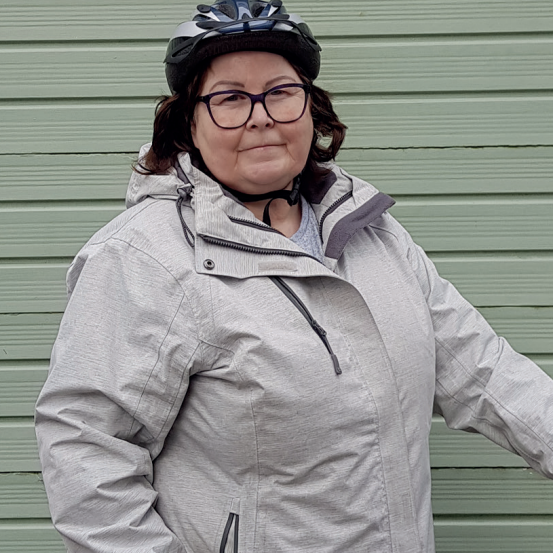
If you have never learnt to ride a bike; would like to develop your cycling skills, or become more confident cycling in traffic, you can access cycle training in Manchester.
TFGM is currently running FREE cycle training for all levels of rider (and non-rider) at two Manchester locations:
Bikes and helmets are provided for free.
“I went along to the cycling event with some trepidation as I had never ridden a bike before. From the first moment I was made to feel really welcome and there was a lovely group of ladies present. The instructors were fabulous and within the hour I was cycling! Oh the freedom!
“I never thought I would find anything to replace my beloved hill walking, but I think I may just have found it. I would like to urge anyone thinking of giving it a go to just do it! I have purchased my own bike now and it has given me a new lease of life.
“I would now like to be able to progress to longer bike rides and to meet up with other cyclists to see all of the beautiful countryside that surrounds the Greater Manchester area. The idea of seeing new places and people fills me with excitement. I would like to say thank you to all involved. It’s truly a worthwhile scheme and it has changed life for me.”
Ideas and projects are continuously evolving and progressing at GM Active. View our latest news stories below to find out how we are moving as one and contributing towards building the healthy, happy and prosperous Greater Manchester we all aspire to.
Amanda joined the Nutrition, Exercise and Wellbeing Programme at Your Trust in Rochdale to gain confidence, get support to lose weight and to become active and get fit.
Keep reading to hear what fantastic achievements Amanda had reached by the end of the 12 week programme.

During the course, our friendly, fully qualified team give support to lose weight, set achievable goals, make healthier food choices, exercise to help with weight loss and learn skills to prevent weight gain.
A GP, practice nurse or health advisor can refer you to the programme or you can self-refer by contacting 01706 923685 or exercise.referrals@rochdale.gov.uk or by clicking the link below.
At the end of the 12 week programme, Amanda has had some fantastic achievements:
“Over the 12 weeks, I’ve learned a lot of things including what to eat, how much to eat and the daily allowance of salt and sugar. I’m now cooking with herbs and spices rather than jars and use the eat well plate as a guide of what to include in my meals.
“And I’ve increased the amount of fruit and veg that I’m eating each day. The programme is excellent, and I would recommend it to everyone.
“Attending the group was my first achievement but every bit of information given is broken down and made easy to understand and follow which is what I needed.
“I’m feeling better and am more active, and people are noticing a difference. It’s also made a big impact on my mental health and wellbeing as I now feel that my depression and anxiety are more manageable.”
Ideas and projects are continuously evolving and progressing at GM Active. View our latest news stories below to find out how we are moving as one and contributing towards building the healthy, happy and prosperous Greater Manchester we all aspire to.
This project was one simply aimed to engage African and Caribbean women in swimming lessons for a 10-week period.
The participants would be provided with a Soul Cap, made to manage Afro hair, and taught how to swim with the intention of improved confidence and water safety, while becoming more physically active and having a positive impact on overall health and wellbeing.
The Soul Cap itself was the subject of controversy at the Tokyo 2020 Olympics, where it was banned – a move overturned two years later.
Among discussions about this and Black History Month, conversation turned to giving women from African and Caribbean backgrounds the chance to learn to swim and to encourage continued activity for health and wellbeing purposes beyond that.
GLL and Buzz agreed to joint fund the project, which would engage two cohorts of a total of 20 people in swimming lessons.

Information regarding the project was made available to local community groups that supported the BAME communities and encouraged those interested to register their interest.
There were five leisure centres across the city that were being made available: Arcadia Library and Leisure Centre, East Manchester, Hough End, Moss Side Leisure Centre and North City Family and Fitness Centre.
Women from the African and Caribbean community were the initial target participants; however, one male and a few South Asian women were given the opportunity to participate.
The project hoped to achieve improved water confidence along with the confidence to go swimming independently following the project which would in turn provide positive movement towards improved health and wellbeing.
A celebration event was held with some of the participants, stakeholders and local councillors to showcase the impact and give the participants recognition for their achievement in taking part.
Feedback from those who took part included:
The celebration was well received and provided an opportunity to seek further funding to support similar opportunities via a Neighbourhood Investment Fund application to support wider opportunity for the African and Caribbean community.
This what some of those who completed the project had to say…
*Images sourced from The Black Swimming Association
Ideas and projects are continuously evolving and progressing at GM Active. View our latest news stories below to find out how we are moving as one and contributing towards building the healthy, happy and prosperous Greater Manchester we all aspire to.
The Bury Live Well Service compromises of four neighbourhood teams that focus on the needs and priorities of each neighbourhood.
Our teams will provide free personalised support. We believe in creating a healthier community where everyone can:
We help people to…
We have supported thousands of people across the Borough of Bury to reach a healthy weight; build more activity into their daily life; stop smoking; eat better; and generally improve their health and wellbeing.
We are here to help people stay well, stay independent, and enjoy life for longer. We help people to…
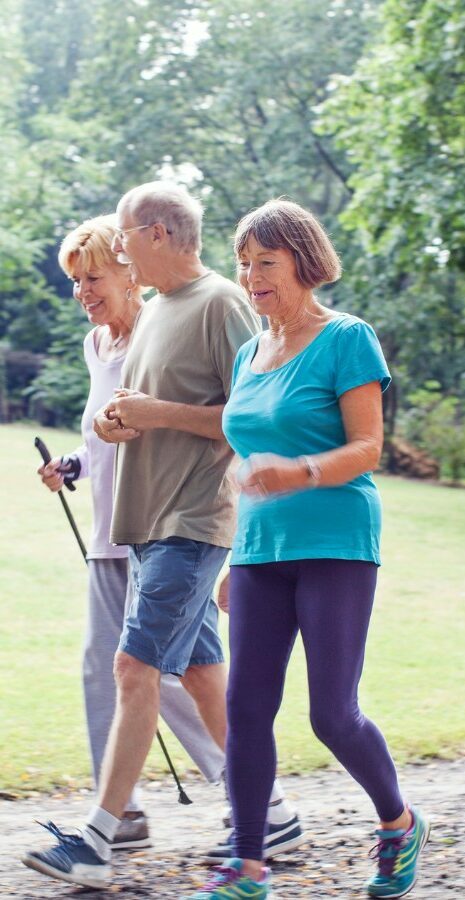
Janette was referred to us from physiotherapy suffering with neuropathy, which was causing severe balance issues.
She had experienced many falls, one of which had resulted in a broken nose. As a result, she was anxious about having further falls and had greatly reduced her activity levels due to fear.
She also has Raynaud’s disease and was getting very cold, white hands and feet which was painful and scary at times. She wasn’t medicated for this and wasn’t sure what she could do to help.
She had been given exercises for her hands and feet by physiotherapy but was looking to take a wider-ranging approach to her health and to develop an overall more active lifestyle.
She was medicated for restless legs which were worse at night and had suffered with vertigo in the past but put it down to stress.
She also had bursitis in her hip and had had injections some time previously which had helped with pain but had some limited range of movement and had lost some lower body strength.
Janette was supported by Live Well officers Cheryl and Bev. Janette originally had a face-to-face consultation with Chery at Castle Leisure Centre when Cheryl provided a full wellbeing timetable as well as details on how to book classes, what each class covered and all other relevant information.
As a result, Janette started Monday morning classes run by Bev in Ramsbottom, which is ideally located for her to walk to, thus already giving motivation to increase regular walking.
Over 13 months, Janette has attended regularly and consistently on a weekly basis. Through regular strength, balance and cardiovascular exercises, she has improved her fitness and strength levels as well as her balance.
She has increased the weights she can lift, as well as her cardiovascular and muscular endurance.
During classes, Bev also aims to educate members on how to help stay as safe as possible in their everyday life, for example foot placement when standing, techniques for going from sitting to standing safely and being aware of head movements, speed of movements etc. when doing any balance work.
Ideas and projects are continuously evolving and progressing at GM Active. View our latest news stories below to find out how we are moving as one and contributing towards building the healthy, happy and prosperous Greater Manchester we all aspire to.
The Bury Live Well Service compromises of four neighbourhood teams that focus on the needs and priorities of each neighbourhood.
Our teams will provide free personalised support. We believe in creating a healthier community where everyone can:
We help people to…
We have supported thousands of people across the Borough of Bury to reach a healthy weight; build more activity into their daily life; stop smoking; eat better; and generally improve their health and wellbeing.
We are here to help people stay well, stay independent, and enjoy life for longer. We help people to…

Cheryl was referred to us by the stroke team at Fairfield Hospital following a stroke in 2022 and kept falling, which had a huge impact on her quality of life.
Cheryl’s confidence massively declined as she chose to stay at home due to having a fear of falling when she was on her own.
While Cheryl was receiving regular physio after her initial stroke to restore loss of movement, she could not drive. She was very restricted and felt like she put a lot of pressure on her husband who was taking her to the appointments so gradually stopped going.
Over six months of regularly supporting Cheryl with regular check ins and face-to-face chats there was a massive change in Cheryl’s wellbeing.
Cheryl started attending two wellbeing classes per week and can do the advanced options of the exercises set.
Cheryl thought she had lost her independence forever, and never thought she would be able to drive again. She now independently drives herself to the classes every week, which was a huge milestone for her and her family.
Live Well Officer Lizzie Howard says:
“From meeting with Cheryl face-to face in her initial consultation, I could see how much of an impact the physical and mental health outcomes from the stroke had had on her life, the sudden changes at home, at work and in her relationship.
“Cheryl did not feel safe exercising on her own therefore I suggested we started off with trying one strength and balance exercise class at her local leisure centre, as I felt they provided the correct support for her to feel confident whilst exercising.
“Cheryl started to come to my strength and balance class on a Friday morning. This was great as I was able to have regular contact with her, checking in with her week by week, setting her little tasks to do each week, making sure she was making progress and giving her the praise she deserved.
“Some tasks involved reaching out to friends and going for a coffee or going to the garden centre and treating herself.”
Cheryl is no longer a frequent faller, since being under Bury Live Well Service Cheryl hasn’t had a single fall, with Cheryl’s strength, balance and mobility getting better each week, she has the confidence to do other activities she never dreamt of doing.
Cheryl says:
“For the first few weeks I found the exercises quite difficult and was very tired afterwards.
“After a few months, I was more able to complete the exercises and started to notice improvements in my mobility. At this point, I started a second chair-based class and began to go to classes twice a week.
“The improvements to my mobility and balance have been terrific. I now can walk much further and feel my balance has greatly improved and have I have not had any falls since starting the classes.
“Another great improvement has been the ability to stand up from a chair and sit back down, which is particularly useful when there are no disabled toilet facilities available!
“My family and friends have all commented on the improvement I’ve made. My husband says it is startling.”
Ideas and projects are continuously evolving and progressing at GM Active. View our latest news stories below to find out how we are moving as one and contributing towards building the healthy, happy and prosperous Greater Manchester we all aspire to.